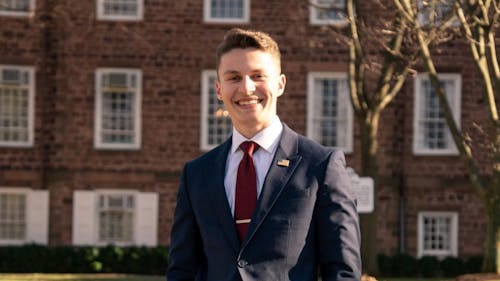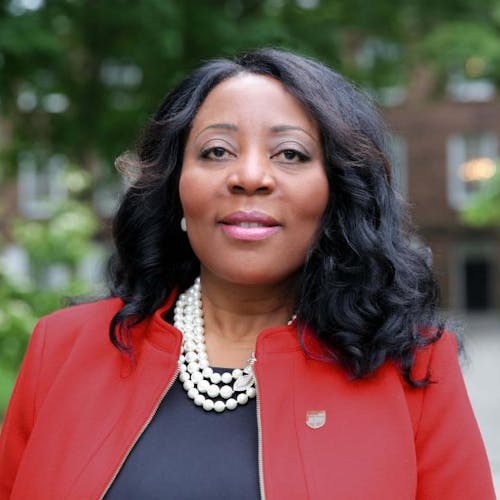RUSA president resigns following ethics complaint

Gavin Mayes, a School of Arts and Sciences senior, resigned from his former position as Rutgers University Student Assembly president as of Sept. 1 after an internal conflict between himself and other members of the executive board.
Assembly Secretary Andrea Jimenez, a School of Arts and Sciences senior, filed an ethics complaint on July 20 citing abuse of power in planning the Assembly’s annual retreat. The purpose of this retreat is to help incoming executive board members to review their roles and plan for the school year, said Lori Smith, the Assembly’s advisor and associate director of Student Involvement.
Mayes was set to take part in an impeachment trial for the complaint but resigned beforehand, according to a letter from him to the Assembly.
“More recently … I have realized that no matter the outcome of this specific trial, relationships with key members of the Assembly have been unfortunately torn to a point where progress forward with me as their leader will not result in the plan I had in store when campaigning to become president,” Mayes said in the letter. “As a result of this, I will be resigning as the Student Body President of Rutgers University—New Brunswick.”
In the ethics complaint, Jimenez argued that Mayes made several attempts to take charge of the retreat planning process, going against the Assembly’s standing rules which state, “The secretary shall be responsible for coordinating any processes involved with organizing (an Assembly) trip or retreat.”
She said the first instance in which Mayes attempted to overstep her responsibilities for retreat planning occurred on May 16, according to the complaint. In this instance, Jimenez said Mayes tried to discuss retreat planning during an executive board meeting, in which she and the Legislative Affairs Chair Miguel Ribau, a School of Arts and Sciences senior, said this was the secretary’s job.
Following this event, Jimenez worked throughout June with Smith to plan the retreat and set the date for July 23 to July 25, according to the complaint. On July 2, the day in which reservations were going to be made, Jimenez said she was informed by Smith and then-Assembly Vice President Nikhil Sadaranganey, a School of Arts and Sciences senior, that they and Mayes decided to make the retreat only one day without her knowledge.
After this incident, she said that she came to a compromise with Mayes and Sadaranganey to make the retreat two days, according to the complaint.
Jimenez also mentioned the occurrence of a public dispute on July 14 in the executive board Slack channel between Mayes and the Assembly Parliamentarian Bilal Yousuf Ahmed, a School of Arts and Sciences senior, that resulted in several members expressing discomfort about going to the retreat. She discussed with Sadaranganey and Smith whether to postpone the retreat, with Smith saying she had time to make the decision.
On the same day, Jimenez said Mayes texted her not to postpone the retreat, according to the complaint. She responded that she would take his suggestion into consideration as she made her decision.
Mayes said that it was not a suggestion, according to the complaint.
“This blatantly felt like another attempt to undermine my authority as (the Assembly) secretary and to pressure me into submitting to his demands,” Jimenez said.
She said she continued to talk with executive board members on July 15 regarding the decision to postpone the retreat, with Sadaranganey also telling her it was not a suggestion to keep the retreat the same date. She said Sadaranganey's tone felt more respectful of her position.
In the complaint, Jimenez said Smith and Mayes made the final decision on July 16 regarding the dates and planning of the retreat without her consent or knowledge, according to the complaint. Jimenez informed Smith, Mayes, Sadaranganey and Assembly Treasurer Adnan Akbar, a Rutgers Business School senior, that day in a meeting that she would file an ethics complaint.
Despite their involvement in the incidents as described by Jimenez, Smith and Sadaranganey were not subjects of the ethics complaint.
Mayes said Jimenez was included in the meeting where he, she and other executive members decided to shorten the length of the retreat. He said he told her not to move the date of the retreat because she had tried to do so without his knowledge, and he expressed the need to discuss the matter first.
“What made it astonishing was the clear bias, corruption and hypocrisy on display throughout the entire situation,” Mayes said. “One pretty clear example of the hypocrisy was the reasoning for moving the retreat by the secretary, claiming it was to prevent any awkwardness for the executive board members given the public dispute that occurred. Instead, after we all moved on, she introduced the ethics complaint to the executive board two days before the retreat, rekindling the awkwardness and exacerbating it.”
He said Jimenez failed to make the necessary preparations in time for the retreat, such as securing a room, creating a schedule and notifying presenters, requiring Smith, Sadaranganey and Mayes to prepare them last minute. He said the Assembly’s standing rules state the president is responsible for ensuring other officers and committees are fulfilling their duties.
“With what occurred during the executive board retreat, it became apparent that the secretary and others would rather see a failed retreat or none at all than to admit they needed help and accept it,” Mayes said. “This is selfish individualism that destroys teams.”
The Assembly’s Internal Affairs Chair Jason Yu, a Rutgers Business School senior, investigated the case according to standard procedure, but Mayes said his report left out mention of Jimenez’s mistakes. He said Yu did not consider that the president might need to act as a check and balance for other executive members.
“What check and balance is there on the secretary from unilaterally making bad decisions on planning the retreat, like moving the date just days before?” Mayes said. “It’s an extraordinarily dangerous precedent to set, and now it’s there. If the secretary makes a poor decision with the fall retreat, who’s going to correct it?”
Smith said the Internal Affairs committee followed the appropriate policies and procedures and conducted an independent investigation.
Mayes said Yu acted as a principal advisor to Ahmed during last spring’s Assembly elections when he was running against Mayes for president. He said Yu and Ahmed attempted to prevent him from bringing the case to the Assembly’s Judicial Council, along with Ribau and the previous Student Affairs Chair Nina Gohel, a School of Arts and Sciences junior, to increase the chances of impeaching him.
Ahmed, Gohel, Jimenez and Ribau previously ran against Mayes’ ticket last spring, according to the Assembly’s Spring 2020 election results.
They did not respond to The Daily Targum’s request for comment.
“It had always been apparent that a portion of the executive board was not there to support me, but it quickly became apparent that their sole motive was to undermine the administration and overturn the election,” Mayes said. “No president before me had been impeached, and certainly not for the laughable reason I was.”
But he had still intended to partake in the impeachment trial, he said. This changed the Sunday before the trial, when Gohel alleged that he was misogynistic and abusive toward women, including Jimenez.
Gohel alleged Mayes spoke to her in an offensive way during an executive board meeting. Mayes said he was mourning a family member's death at the time, which impacted his tone, but he said Gohel claimed his case with Jimenez was further evidence of her allegations.
“I want to make it unequivocally clear that my dispute with the secretary was performance-based, and in no way, shape or form a result of her being a woman,” Mayes said. “The mere fact that (Gohel) cited this as evidence was disgusting, and I had numerous discussions with our advisor about this because of how distraught it made me."
Mayes said Gohel told the executive board they would promote misogyny and toxicity if they voted to hold his impeachment trial in person, and said the trial was moved after he briefly left the Zoom call due to an issue at home.
Mayes said Gohel made these claims of misogyny not to improve conditions within the Assembly but to "advance her own political career" and hurt her rivals, including himself.
In regard to his case with Jimenez, Mayes said he respects her decision to file the complaint and that their conflict was a matter of professional disagreement on the way the Assembly is run, according to his letter.
Mayes said he hopes the Assembly makes reforms to its procedures, such as making it so that impeachment trials do not depend on a single individual’s interpretation of the Assembly’s standing rules. He said the Assembly’s Judicial Council, which consists of five members, should be the only ones to interpret.
“(The Assembly) needs a leader who understands the internal workings of the Assembly and can fix the shortcomings in it before focusing on the larger problems,” Mayes said. “My vision for our home had me overlook the growing internal conflict, and this ultimately became my downfall.”
Sadaranganey and Gohel were sworn in last Thursday as Assembly president and vice president respectively, and Mayes said he will help the new president guide the Assembly's direction.
“I did not expect to be in this position, but now that I’m here, I am ready to work with student leaders across the school and work (toward) one goal: improving the quality of life for Rutgers students,” Sadaranganey said. “To do this, I will work in the coming weeks to develop relationships with administrators and reorganize our executive departments as we prepare to execute so many of the great ideas that our committees have to offer.”
He said he plans on continuing the previous president’s goals and initiatives as he enters his term, with improving campus infrastructure as a main priority, especially after the impact that Tropical Storm Ida has had on the Rutgers community. He said the Assembly will consider legislation in the near future to address this issue.
While the resignation of an Assembly president is unprecedented in the 15 years since the body’s establishment, Sadaranganey said Jimenez had every right to file the complaint and that he defers to the processes established by the Assembly governing documents.
He said he believes the investigation was handled in a proper and professional manner with the Internal Affairs Committee ultimately making the independent decision to impeach. Sadaranganey said he respects the Assembly’s process and the outcome for Mayes that came out of it.
“Regardless of the mistakes that he made, he stepped aside and allowed (the Assembly) to heal and to continue to work for the student body,” Sadaranganey said. “The situation as a whole is incredibly unfortunate and there were a number of actions that (Mayes) took that I did not agree with. At the end of the day, I believe everyone involved in the situation will be able to learn from the mistakes that were made and move forward as stronger leaders and students.”



